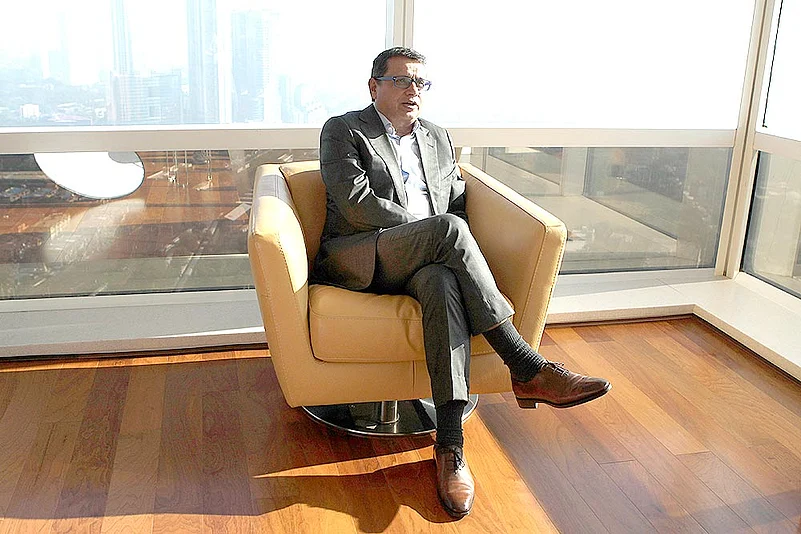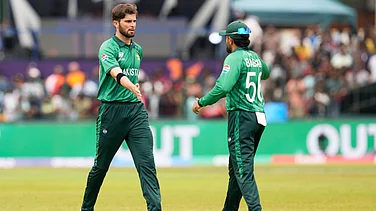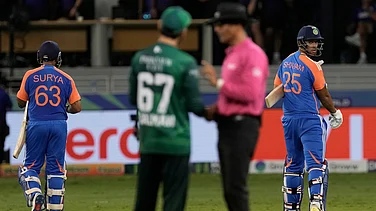- Rs 16,347.50 cr IPL media rights deal for 2018-22
- Rs 91,000 cr STAR’s approx net worth*
- 22-23% Network share among Indian broadcasters
- 59 No. of STAR channels
*Source: Edelweiss, 2016
***
India’s most powerful television man describes himself as a “conservative” and “somewhat boring person”; he doesn’t like noise and crowds. Perhaps, that is why STAR India chairman-cum-CEO Uday Shankar has chosen a corner on the vast 37th floor, the highest occupied floor of the 39-storey skyscraper in Mumbai, for his personal chamber. But for all his gentle, soft-spoken air, his deals have a touch of bluster and bombast. He has turned around the STAR group of channels into one of the most profitable in the entertainment and sports business in India.
The jholawala-turned-TV honcho’s latest masterstroke is the acquisition of the Indian Premier League media rights for a mind-boggling Rs 16,347.50 crore (or about $2.5 billion) for five years, from 2018 to 2022. STAR beat 13 other competitors, including giants like Facebook, Reliance Jio, Bharti Airtel and Sony, in a win-all-or-quit battle this month. As Shankar says, the company had chalked out a “risky” strategy to acquire the rights for both television and digital platforms for all the territories on offer. “We had worked very hard to come up with a strategy,” Shankar, who turns 55 on September 16, tells Outlook in an interview, relaxed in his spacious and tastefully decorated office in Mumbai. “I knew it was a very risky strategy. We had decided we would either win all the rights or we would win none. And the offer we were going to make was a large sum of money.”
STAR India also has the media rights for all BCCI matches until March next year, but Shankar was keen to acquire the IPL rights, which rival Sony had held for 10 years since IPL’s inception in 2008. The IPL auction made him tense, he admits. “The question on my mind was: would I be letting my team down by taking such a risky strategy—that we offer so much money and yet there was a chance we might not win any of the rights? And was I taking a disproportionate risk?” he wonders now.
Shankar’s story is somewhat similar to that of STAR—full of risk-taking and coming up trumps in the end. Much like STAR’s dominance in the television entertainment segment, the story of Shankar is no less a fairy tale—becoming the top television executive from being a hardcore print journalist. Coming from a middle-class family in Patna, he went to several schools across Bihar. After graduation, the next step was Delhi’s Jawaharlal Nehru University (JNU) for an MPhil, where he wore jeans, kurta and slippers, and actually hung a jhola, as the JNU stereotype goes. His politics was clearly left of centre.
After college, he had no clear career path before him, making him attempt the civil services like most of his peers. Unable to clear it, he eventually traipsed into journalism. A friend told him he had three options—become a lawyer, an MBA or a journalist. “Law was an interesting idea, but the life of a lawyer did not excite me much. My understanding of law then was that it was about making fine points. I felt the purpose of life had to be bigger than just making fine points. MBA too was clearly unappealing. We thought the corporate sector meant selling detergent and biscuits. So, given my political awareness in JNU, the fact that I was always interested in contemporary affairs, I thought journalism was a natural option for me,” he recalls.
After doing a journalism course from a Times of India institute in Delhi, he worked for the same paper in Patna. In two years, he returned to Delhi to work in other publications, such as Down to Earth, the new environment magazine launched by Anil Agarwal. Meanwhile, the TV boom was just starting in India and he gravitated towards this new medium, just like many print journalists of that time. Interestingly, Shankar hadn’t seen much of television until he got admission in JNU. He also got to see colour TV for the first time there, in 1982, when Doordarshan began colour transmission to coincide with the Delhi Asian Games.
Cut to the 1990s, when satellite TV was putting down roots in India. Shankar’s first foray here was with Zee TV as a news producer. A couple of job changes later, he got his first big break when the Hindi news channel AajTak was launched by India Today Group owner Aroon Purie in 2000 with Shankar as director. Later, he helped set up the English channel Headlines Today. After about four years at AajTak, Shankar recalls he was “getting a bit bored doing the same thing again and again…. There was also this question at the back of my mind whether AajTak’s success was an accident or fluke. I thought maybe trying out new things would test me and, if I could do it a second time, then maybe I really had a contribution to make. In all honesty, I was a little unhappy with things at AajTak by then.” He is all praise for Purie, though.
The change happened suddenly. Shankar got a call from ABP supremo Aveek Sarkar, who had bought a share in STAR News, and eventually joined the channel. “The only bad news was that I had to leave Delhi [he had bought a house there] and come to Mumbai. So, I worked hard and managed to turn the channel around from being a laggard to a leader. And I guess that’s how I came on the radar of the top bosses of STAR Group,” he recalls. Now, the biggest break of his life was just around the corner.

The break came when media mogul Rupert Murdoch made his historic India visit and one of the people he took time out for was Shankar. “I met Murdoch when I was running STAR News and spent some time with him. I met him again when STAR News became the No. 1 channel. He had come to know about me, so he had sent me a note of congratulations on the ‘great work done….’ He was very kind and complimentary,” Shankar says. And then, when a vacancy came up at STAR TV, Shankar was identified as the man to fill the crucial position of the head of the group. He says he had no inkling at all that he would actually be picked, despite having met “a bunch of people”, including Murdoch’s deputy, Peter Chernin.
“I was very surprised, because there was nothing in my background; nothing in my experience; no MBA degree, no entertainment exposure. I was a hardcore newsperson and STAR was a very successful entertainment company. I was not even a consumer of entertainment, let alone being an expert in running entertainment,” he admits. It was a big decision to make and Shankar discussed with his family members the “risk” factor of joining such a big group. His young daughter chipped in with a quip that makes him smile even now. “She said it was not a big risk for you; it’s a big risk for STAR,” he recalls.
That comment probably eased things up at home. “The new, the unusual and the unforeseen have always held an attraction for me. Before that I was CEO of STAR News for some years. So I had some understanding of the business, but it was on a very small scale. This was the big league and I said, ‘Let’s give it a try’.” Today he heads 59 STAR channels.
So what made Murdoch pick him from all the managers he had at his disposal worldwide? “I really don’t know,” says Shankar. “The only thing I can think of is the record I had with STAR News and, before that, running a couple of successful news channels,” he guesses. He also says he never plans anything. “I am not a big career planner. I have done things on the spur of the moment, but always very seriously. Whatever you give me to do, I will do it very seriously, and one thing has usually led to the other. The world has been kind to me and I have been rewarded generously in some ways.”
One reason for Shankar’s success is that as boss, his former colleagues say, he is a totally ‘democratic leader’ and a team man to the core. Ajit Anjum, who also worked with Shankar at AajTak and STAR News, says he always backs his subordinates. “Uday always stood like a rock behind his team. For example, at STAR News, we launched a sharp political satire and at times politicians, on coming to know about the show through promos, would call up to put pressure for stopping the show. But Uday would allow us to run the show and switch off his phone for sometime to deflect the pressure,” Anjum recalls.
The present News Nation managing editor Ajay Kumar, who worked with Shankar at AajTak and STAR News, remembers his fine rapport with his team. He recalls how Shankar let a live telecast of a pre-2004 general election debate show continue despite a fist fight among the audience, which was sparked by a remark from former cricketer and the BJP’s Amritsar candidate Navjot Singh Sidhu against his rival candidate from the Congress. “There was an audience of about 2,500 in this show and they were all fighting on the stage. It was unmanageable and the stage caved in. Any boss would have yanked the live telecast off. But Uday told me to ‘just keep going’,” he says.
Shankar loves to innovate and take on new challenges. For example, his decision to promote kabaddi in 2014, in the form of Pro Kabaddi League (PKL), along with automakers Mahindras. PKL became a big hit among viewers, surprising his critics. They initially dubbed the PKL move as a gamble. Shankar begs to differ. “I am a conservative man. I take calculated bets and risks because that’s how you build businesses. The one thing I think I understand is the pulse of the common man of this country. As a student of liberal arts, an activist in student days and as a newsperson, I have developed this understanding of where mass sensibilities lie. My friends told me that nothing works in India other than cricket. Somehow it didn’t square up for me,” he argues. STAR India is also promoting badminton, football, hockey and table tennis, and it holds the ICC broadcast rights.
What about failures? There has been a big one—Champions League T20 cricket. Shankar says STAR took over a “limp tournament” that was making huge losses. So, it pulled out midway through the 10-year contract by paying a compensation amount to the BCCI and the Australian and South African boards, which jointly ran the tournament. Another of STAR’s sports-related pullouts was from the ESPN-Star Sports joint venture in India some years earlier and Shankar played a key role in that as well. Now, he has charted a new territory for STAR by acquiring the IPL media rights with his “risky” but successful bid. Given his creativity, penchant for innovation and ability to take calculated risks, expect something different when the 11th edition of the IPL is played next year.
By Qaiser Mohammad Ali in Mumbai


























